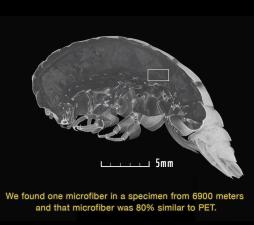 British researchers have discovered a new species of amphipod. The team from England’s Newcastle University, led by Dr Alan Jamieson, found the shrimp-like crustacean in the Pacific Ocean’s Mariana Trench between Japan and the Philippines and below the Great Pacific Garbage Patch. The Mariana Trench is the deepest point on Earth’s surface, reaching more than 36,000 feet (11.000 meters) deep.
British researchers have discovered a new species of amphipod. The team from England’s Newcastle University, led by Dr Alan Jamieson, found the shrimp-like crustacean in the Pacific Ocean’s Mariana Trench between Japan and the Philippines and below the Great Pacific Garbage Patch. The Mariana Trench is the deepest point on Earth’s surface, reaching more than 36,000 feet (11.000 meters) deep.
Despite the great depth at which the animal was discovered, the researchers were alarmed to find that the animal’s stomach contained pieces of polyethylene-terephthalate. Polyethylene-terephthalate, commonly abbreviated PET, is a common plastic resin used in fibers for clothing, in packaging for food and bottles for liquids. They decided to name the animal Eurythenes plasticus to highlight that plastic pollution is now so prevalent that even a new species of amphipod living nearly 7km below sea level had ingested plastic.
Jamieson told NZHerlad.com that they called the amphipod Eurythenes plasticus “because sadly that’s one of the most conspicuous things we found on the species, and I think we need to get that down in the taxonomic record”.
“We’re just making a statement to say that we’re now at the point where we are looking at a new species from an unexplored habitat and it’s already contaminated with plastic,” he said.

This global warming/human being are ruining the planet nonsense has gone too far…
4 days ago a very average volcano in Indonesia violently erupted…scientists confirm that in 12 hours of spew, it released more CO2 into the atmosphere than the driving of EVERY automobile EVER PRODUCED.
Clothes fibers in the ocean? SO WHAT! Human life expectancy has almost tripled in a mere 500 years BECAUSE of modern inventions, better clothes, modern medicine, things produced in factories.
Humans emit 100 times more CO2 than volcanoes. At this point, climate change denial is simply ignorant.
https://skepticalscience.com/volcanoes-and-global-warming.htm